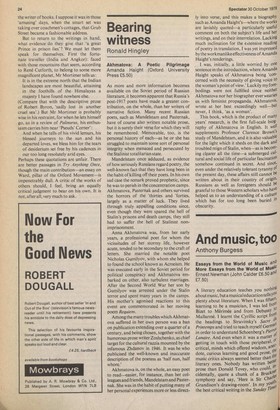Bearing witness
Ronald Hingley
Akhmatova: A Poetic Pilgrimage Amanda Haight (Oxford University Press £5.50) As more and more information becomes available on the Soviet period of Russian literature, it becomes apparent that Russia's post-1917 poets have made a greater contribution, on the whole, than her writers of narrative fiction. Many recent Russian poets, such as Mandelstam and Pasternak, have of course also written notable prose, but it is surely their verse for which they will be remembered. Memorable, too, is the personal history of each—as he or she has struggled to maintain some sort of personal integrity when menaced and persecuted by the Stalinist totalitarian state.
Mandelstam once adduced, as evidence of how seriously Russians regard poetry, the well-known fact that they have long been in the habit of killing off their poets. In his own sad case the remark proved prophetic, since he was to perish in the concentration camps. Akhmatova, Pasternak and others survived the horrors of the 'thirties and 'forties, largely as a matter of luck. They lived through truly appalling conditions since, even though they were spared the hell of Stalin's prisons and death camps, they still had to suffer the hell of Stalinist nonimprisonment.
Anna Akhmatova was, from her early years, a professional poet for whom the vicissitudes of her stormy life, however acute, tended to be secondary to the craft of letters. She married the notable poet Nicholas Gumilyov, with whom she helped to found the school known as Acmeism. He was executed early in the Soviet period for political conspiracy and Akhmatova embarked on other, also turbulent marriages. After the Second World War her son by Gumilyov was arrested under the Stalin terror and spent many years in the camps. His mother's agonised reactions to this event are commemorated in her moving poem Requiem.
Among the many troubles which Akhmatova suffered in her own person was a ban on publication extending over a quarter of a century, and being chosen, together with the humorous prose writer Zoshchenko, as chief target for the cultural razzia mounted by the infamous Zhdanov in 1946. It was he who publicised the well-known and inaccurate description of the poetess as 'half nun, half whore.'
Akhmatova is, on the whole, an easy poet to read—easier, for instance, than her colleagues and friends, Mandelstam and Pasternak. She was in the habit of putting many of her personal experiences more or less direct ly into verse, and this makes a biography such as Amanda Haight's—where the works are lavishly quoted—a particularly useful comment on both the subject's life and her writings, and on their interrelation. Lacking much inclination for the extensive reading of poetry in translation, I was yet impressed by the workmanlike effectiveness of Amanda Haight's renderings.
I was, initially, a little worried by one sentence in the introduction, where Amanda Haight speaks of Akhmatova being 'concerned with the necessity of giving voice to the woman's point of view.' Luckily my forebodings were not fulfilled since neither Akhmatova nor her biographer ever wearies us with feminist propaganda. Akhmatova, wrote at her best exceedingly well—but never, I think, 'as a woman'.
This book, which is the product of manY years' research, is the first full-scale biog• raphy of Akhmatova in English. It well supplements Professor Clarence Brown's study of Mandelstam, and it is also valuable for the light which it sheds on the dark and troubled reign of Stalin, when—as is becoming clearer all the time—a submerged cultural and social life of particular fascination somehow continued in secret. And since, even under the relatively tolerant tyranny of the present day, these affairs still cannot be written about in their country of origin, Russians as well as foreigners should be grateful to those Western scholars who have helped us to an understanding of a culture which has for too long been buried I" obscurity.


































 Previous page
Previous page